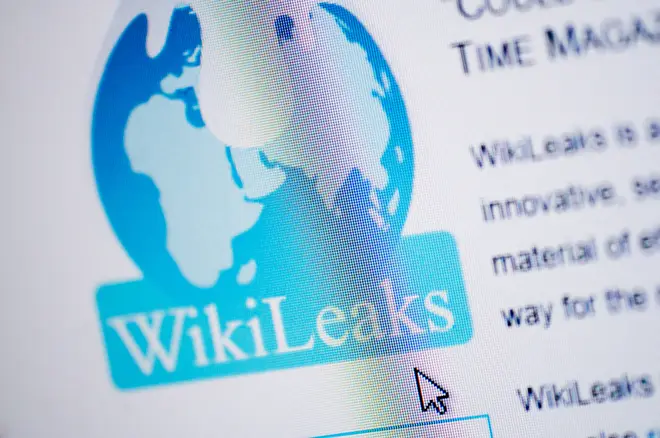
Nick Abbot 10pm - 1am
17 June 2022, 10:21 | Updated: 17 June 2022, 12:15

Home Secretary Priti Patel has signed an order to extradite Julian Assange to the US to face espionage charges, the Home Office has confirmed.
Assange, 50, is wanted in America over an alleged conspiracy to obtain and disclose national defence information following WikiLeaks' publication of hundreds of thousands of leaked documents relating to the Afghanistan and Iraq wars.
In December he was denied permission to appeal against the High Court's decision in to extradite him to the US, leaving the decision to Ms Patel.
Read more: Wikileaks founder Julian Assange denied permission to appeal US extradition
Read more: Julian Assange issued with order extraditing him to the US on spying charges
The Home Office says there are no legal grounds to prohibit his extradition.
Mr Assange, an Australian currently being held at Belmarsh prison in London after mounting a lengthy battle to avoid being extradited, has 14 days to appeal.

A Home Office spokesperson said: "Under the Extradition Act 2003, the Secretary of State must sign an extradition order if there are no grounds to prohibit the order being made. Extradition requests are only sent to the Home Secretary once a judge decides it can proceed after considering various aspects of the case.
"On 17 June, following consideration by both the Magistrates Court and High Court, the extradition of Mr Julian Assange to the US was ordered. Mr Assange retains the normal 14-day right to appeal.
Read more: No relief from Rishi: Hopes of tax cuts dashed until 11% inflation threat eases
Read more: Rail strikes could 'end up killing people': warning from health chiefs ahead of walkout
"In this case, the UK courts have not found that it would be oppressive, unjust or an abuse of process to extradite Mr Assange.
"Nor have they found that extradition would be incompatible with his human rights, including his right to a fair trial and to freedom of expression, and that whilst in the US he will be treated appropriately, including in relation to his health."
Under the Extradition Act 2003, the Home Secretary must sign an extradition order if there are no grounds to prohibit the order being made.
— Home Office (@ukhomeoffice) June 17, 2022
(2/4)
WikiLeaks has said it is a "dark day for press freedom and British democracy".
"Anyone in this country who cares about freedom of expression should be deeply ashamed that the Home Secretary has approved the extradition of Julian Assange to the United States, the country that plotted his assassination," the organisation said in a statement posted to Twitter.
"Julian did nothing wrong. He has committed no crime and is not a criminal. He is a journalist and a publisher, and he is being punished for doing his job.
Read more: Bus burst into flames in London as capital swelters and UK set for 34C scorcher
Read more: Investigation launched after disabled passenger dies getting off plane at Gatwick
"It was in Priti Patel's power to do the right thing. Instead she will forever be remembered as an accomplice of the United States in its agenda to turn investigative journalism into a criminal enterprise."
WikiLeaks said the decision is "not the end of the fight" and it will launch an appeal via the High Court.
It said Mr Assange is facing a "political case" in which there is an attempt to "disappear him into the darkest recesses of their prison system for the rest of his life to deter others from holding governments to account".
"We will not let that happen," the statement adds. "Julian's freedom is coupled to all our freedoms. We will fight to return Julian to his family and to regain freedom of expression for us all."

But the approval is unlikely to bring to an end the Wikileaks founder's many years in the UK, legal experts have said.
Mr Assange, who has been at the centre of a protracted legal fight for more than a decade, still has avenues of appeal open to him, according to specialist lawyers.
Kate Goold, a partner at Bindmans law firm, said: "If he still has the desire to fight, which I am sure he does, I think Priti Patel's decision is not the end.
"There are potential further avenues to appeal that he could utilise. It is unlikely to be the end of Mr Assange in the UK."
Ms Goold, who has specialised in extradition cases for around 12 years, added: "I think that he may have already lodged an application for permission to appeal on the other arguments he raised in the lower court around the political elements of this matter and freedom of speech."

Ms Goold said Assange's lawyers would first need to be granted permission to appeal on those grounds.
Even if permission is denied, the lawyers can make an additional oral application to a different tribunal, with Ms Goold speculating that process could take things into the autumn.
And even if that is rejected there could be scope to argue Assange is not well enough to fly, she added.
She said: "If the High Court says no, you're not getting permission to appeal then that's probably the end of it in terms of UK court proceedings, unless for some reason he is too unwell, for example he's not fit enough to fly and extradition is delayed."
If permission to appeal was granted, the hearing might not be until early 2023, Ms Goold said.
"There'd be a lot of work to be done," she said. "Finding court time, it would probably be a long hearing, finding a five-day court hearing slot in the High Court would be quite hard so that would probably go into spring 2023, I imagine."
Even after all of this, it still may not be the end, Ms Goold added.
She said: "In exceptional circumstances and if there is a 'supervening event' after extradition is ordered, Mr Assange also has an avenue to appeal the decision to extradite under human rights grounds if it is necessary to avoid real injustice. He could also make an application to the European Court of Human Rights (ECtHR)."
Watch: Minister calls on Mayor of London to drop congestion charge on rail strike days
Read more: LBC Views: Five years after Grenfell survivors now speak of a lack of impetus and justice
Rebecca Niblock, a partner at Kingsley Napley who has worked in extradition law for 14 years, said an application to the European Court could delay any move to send him to the US.
She said his team would most likely "request that it (an ECHR case) had suspensive effect on the extradition proceedings and the European Court would either say yes or no to that".
She added that an ECtHR case could take years, saying: "Once you get to the European Court of Human Rights it's a very, very slow process."
Echoing Ms Goold's thoughts following Ms Patel's decision, Ms Niblock said: "Extradition is a very lengthy process and it is very unlikely that this will be the end of it."
If no application for permission to appeal is lodged, Assange must be extradited within 28 days, unless the prosecution applies for an extension.